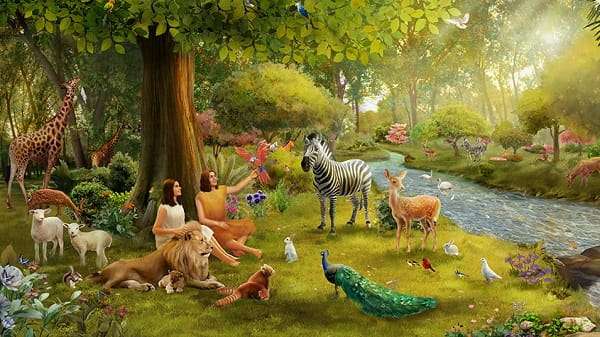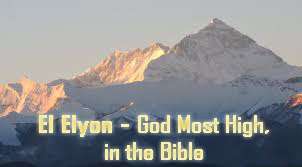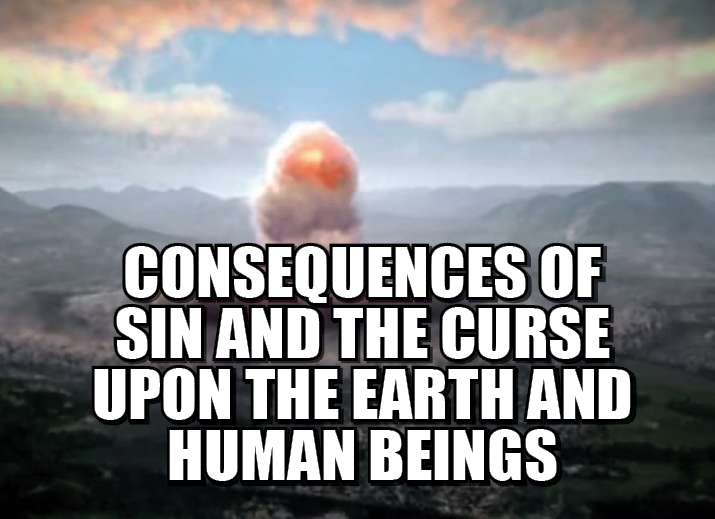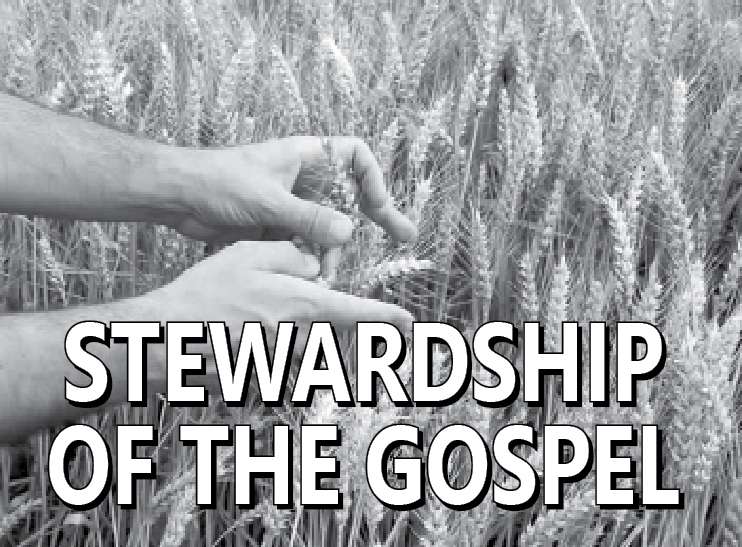
An Exposition on Genesis 2:15
Pr. Thomas Cherian
INTRODUCTION
Some years ago a warden of a reputed Christian institution was seeking an explanation from a brother for intentionally throwing the waste materials into his neighbour’s backyard. The response of the highly qualified believing brother was shocking;
“I merely did the same what my neighbour has been doing.” If the people around us are going to respond like this, what will be the future of the ecosystem we are living in? An ecosystem is a community of living organisms in combination with the non living components of their environment (things like air, water and mineral soil), interacting as a system. Genesis chapter two verses fifteen is a significant passage to understand our ecosystem from a biblical point of view. This passage is part of the six days creation account found in Genesis chapter 1 and 2. After the creation of Adam in Gen 2:7, God places him in the Garden of Eden (v.8). The story continues after a gap of six verses. Verse 15 states the very purpose of placing Adam in the Garden of Eden. The Hebrew word for Garden of Eden suggests that it was an enclosed garden of delight and pleasure. It definitely was a beautiful place distinct from the rest of the earth. The following exposition will focus on few important words, their meanings, various lessons and implications that can be drawn out of the given text (Gen 2:15) related to our ecosystem.
I. IMPORTANT HEBREW VERBS AND THEIR MEANINGS
Genesis chapter two contains a parallel account of creation, adding details to certain parts of the narrative of the first chapter. Notice God's expanded instruction: "Then the LORD God took the man and put him in the Garden of Edento work or tend [dress, KJV] and keep it" (verse 15). This greatly modifies the force of "have dominion" and "subdue it" from Gen. 1:26, 28. nuakh, ’abadh and shamar are the three notable Hebrew verbs found in Gen. 2:15, which call for explanation.
a) nuakh
The Hebrew root word nuakh is translated as ‘put’ or ‘placed’ in several versions. Etymologically the root word means ‘to rest,’ ‘caused to rest’ or ‘comfort.’ We do not know what is actually intended by the expression ‘the LORD God took the man.’ God either spoke to him or impressed it on his mind, and inclined him to go, or stay in Eden to dress it and keep it. The further discussion will explain whether this process provided him any rest or comfort.
b) ’Abad
The Hebrew root 'Abad means 'to tend', 'work' or 'serve', and when it refers to the ground or a garden, it can be defined as to till or cultivate. In the King James Version (KJV) the word‘dress’ is used implying beautification, decoration, or improvement.
c) Shamar
The Hebrew root Shamar means 'to keep' or 'exercise' great care over. In the context of Gen. 2:15, it expresses God's desire that mankind, in the person of Adam, may ‘take care of,’ or ‘guard over’ the garden. It seems that God did not
expect man to live an idle life, even in a state of innocence; however, we don’t see the toil, labour, sorrow or sweat in the garden, as experienced after the fall. The work was rather for his recreation and pleasure. This ultimately could provide him with a sense of rest or comfort. One of the Jewish writings even suggests that Adam was resting or relaxing by meditating on the God given things in the garden.
There are a few lessons that can be learnt from the given text and the word meanings of the above mentioned verbs.
II. LESSONS FROM THE TEXT
a) God is the Actual Owner of the Land
One of the important lessons we should learn is to remind mankind that the Earth actually belongs to God(Lev. 25:23; Ps.24:1; Ex 19:5). This is why God is taking initiative to place Adam in the garden with great expectations. If God is the owner, man is the tenant. This makes it all the more clear why God is giving instructions to the new occupants in the first two chapters of Genesis, for the better functioning of the whole ecosystem (cf. Gen 1:28). The regulations to stay intact in the land were made very clear to the Israelites at a later stage(Deut. 28:15-24). The Hebrew word for 'work' is also used in the context of serving God. So, our greatness is to be found in our special place as caretakers of God's glorious creation and enhancing its capacity to acknowledge, praise and glorify its actual owner.
b) Man is Related to the Eco System
The Hebrew word for earth is Adamah. Man or mankind is formed out of the dust of the earth, and that is one reason why he was called Adam (Gen 2:7); therefore he will return to the dust (Ps 90:3). So near an affinity is there between the earth and our earthly parents that our mother's womb, out of which we were born, is called the earth (Ps.139:15), and the earth, in which we must be buried, is called our mother's womb (Job 1:21). Our fabric is earthly, and the fashioning of it is like that of an earthen vessel (Job 10:9). It is therefore not surprising to note that there are around 25 elements (like oxygen, carbon, hydrogen, nitrogen, copper etc.) in big or small measure found in a human body, which are also found in the earth. We are therefore dependent upon earth for food and water and are certainly related to earth. (Job 28:5). This relation makes mankind obliged to the maintenance of the
ecosystem. In other words the health of the whole ecosystem depends primarily on mankind.
c) God of Bible is a God of Order
God of the Bible is a God of Order and not confusion (I Cor. 14:33). He does everything beautifully (Eccl.3:11) and orderly which is evident even in His creation process. It was not difficult for the omnipotent God to create everything on the first day itself. He chose to go step by step and in an orderly fashion. He started recreating from the null and void situation (Gen 1:2) and brought everything into an order. We humans should learn the basic education from God. This could be one reason why God expected His image (Adam) to work. In the King James Version, the word ‘dress’ is used for work in Gen 2:15. In 1611, when the KJV took the final shape, the word 'dress' meant to set in order. Therefore, God expected Adam to be orderly and to set the ecosystem in order whenever and wherever there was a need.
d) Man is bound by covenant of work
It must be admitted that neither the term ‘covenant’ nor the statement that ‘God entered into a covenant with Adam ’is found anywhere in the first three chapters of Genesis. However, Reformed covenant theology has traditionally seen a “covenant of work” between God and Adam in Gen 2:15-17. A covenant usually involves four components: (1) parties, (2) a promise, (3) a condition and (4) a penalty. Here the contracting parties were the triune God on the one hand and Adam as God’s dependent creature on the other hand. So by a positive performance, a covenant relationship was graciously established and Adam was constituted the representative head of the human race so that he could act for all his descendants. The great promise of the covenant of work was the promise of life or good health, which was based on compliance with the condition. The condition included faithfully working and taking care of the garden. Scripture contains no explicit promise of life or good health to Adam. However, the threatened penalty clearly implies such a promise. In other words, mankind was bound by the covenant of work to receive healthy life. If the above discussion is to be taken seriously, mankind has to keep the covenant to stay healthy both physically and spiritually (Gen 2:17; 3:17b). It is a universally accepted fact that physical work or exercise
keeps human beings physically fit.
e) The Land is prone to Degenerate
At the very beginning of the book, God warns of a natural tendency in everything towards disintegration. God wanted mankind to understand that the beautiful garden would not remain in the same state unless maintained. It was subject to natural law and was going to degenerate. The Garden needed to be cultivated, dressed, and kept. That required a great deal of work. Man was to preserve, control, and direct it. If the cultivation occurs, it will guard against degeneration. This effort to cultivate will definitely yield more fruit and greater growth. Therefore even the plants, flowers, and trees of Eden stood in need of cultivation from the hand of man, and would speedily have degenerated without his attention. The animals are not wise and domesticated as human beings and so needed Adam’s assistance to fence the garden against unwanted encroachment and deterioration.
III. THE RESPONSE OF MANKIND TOWARDS ECOSYSTEM
Three undeniable truths can be drawn out of the above discussion based on the given text, regarding mankind’s role in behaving with the ecosystem entrusted by God. Man is certainly Capable, Responsible and a Visionary by nature when compared with rest of the creation.
a) Capable Mankind
Mankind being the image of God are given this great responsibility of caring and controlling the whole creation, because they are understood to be capable (Gen 1:26, 28; 2:15). They are like co creators (assistants) with God in maintaining the system in the whole creation. Psalm 8:5,6 says that Human beings are the crown of the creation and thus have the ability to do what is entrusted to them.
Human being is a very complex and highly evolved creature who possess physical attributes that are not shared by animals, such as an erect posture, hands with a highly developed opposable thumb that can do work; they have a face
which is capable of expressing great emotional feelings and a brain and tongue capable of articulate speech. Most importantly, they possess spiritual attributes not shared by animals, such as a moral consciousness, the ability to think abstractly, an understanding of beauty, emotion, and the capacity to know and worship God. Therefore they have the wisdom to accomplish agreat deal in the present ecological system. The present day achievements across the globe are no doubt proof of man’s ability.
b) Responsible Mankind
Since mankind has been entrusted with the capacity to deal responsively with the creation of God, they ought to do it faithfully. They cannot shy away from the responsibility. They are therefore God’s stewards on earth. Adam and Eve's responsibility was to dress and keep it. They were put there, not just to pluck fruit off a tree, not even merely to receive eternal life, but to take care of the garden.
The verb 'dress' used in KJV also means "to beautify". Thus the first parents were to take care of it so well that it would look much more beautiful. Although what God had made was beautiful, He wanted them to carry on and finish it. It had only been started. So the capable mankind should shoulder the responsibility as a steward. Therefore, as a faithful steward, mankind should be held accountable for the contemporary state of our atmosphere or ecosystem.
c) Visionary Mankind
Man should not only take up the responsibility for the present condition but also think ahead in future as a visionary. The contemporary state of our planet earth is very alarming. Scientists, environmentalist and world political leaders are raising concern over the deteriorating state of our entire ecological system. With the increase in global warming and its effects, there are lots of discussions and deliberations made all across the globe. Some are even quoting Biblical passages to blame the so called developed and Christian nations.
To the environmentalists, letting man have dominion over the animals and being told to subdue the earth means that God gives man freedom to do anything he wants to the planet for his own selfish benefits. Environmentalists are correct in saying that mankind should consider and address environmental concerns. They are quite wrong, however, to blame God for earth's ecological problems. Certainly, God did not give mankind the authority to degrade and destroy His earth. In reality the irresponsible behavior and short-sightedness of man has led to all these mess in the ecosystem today. Mankind has absolutely no right to mine, burn or kill without showing any care for the nature.
So mankind should be futuristic in their thinking. Yes, it’s high time to seriously think and develop a vision for the future. He/she should seriously think about the above raised concerns and not only discuss but also start implementing policies on an urgent basis to safeguard the planet earth.
Who should take the first step? I think it is the duty of a holistic Christian to break the ice.
IV. THE MARK OFA HOLISTIC CHRISTIAN
A true Christian is always holistic in his/her thinking and action. Holistic Christian is a practicing Christian who also considers ecosystem as God given and even cares for the same. How can someone call himself/herself godly, when the expectations of God are not fully met? How can we really pray and be at peace when people around us are suffering because of the pollution in our God given surroundings? Two important qualities of holistic Christians are discussed below to understand their duty to save our ecosystem from further destruction.
a) To Realize
The foremost stage in our holistic thinking is to realize or come to our senses. We need to be open to criticisms made by the people outside. A self evaluation is must. Christianity has been called arrogant toward nature and charged with being having the historical root of our ecological crisis. In 1967, Lynn White, a historian from California, published an article in Science entitled ‘The Historical Roots of Our Ecological Crisis’. In his article, White maintained that modern science and technology are products of Western culture which has its roots in Christian attitudes and principles. Therefore, Christianity is arrogant toward nature and views nature as having no reason for existence except to serve mankind. Hence, Christianity bears a huge burden of guilt for our current ecological crisis. It’s been a losing battle, and our world ecological crisis continues to deepen. Every day the news is filled with more stories about melting ice caps and glaciers, rising seas and receding fresh water supplies, drought and mega storms, or greenhouse gases and climatic changes.
b) To Execute
A true believer cannot be indifferent or ignorant, on the premise that it deals with earthly rather than spiritual concerns. We should not leave everything totally into the hands of scientists or politicians to find some solution some day. It’s the responsibility of the Church to seriously think of preserving the ecosystem as long as believers reside on this planet. Time has now come to execute rather than just holding conferences. Let the church stand for a swatch Bharat (Clean India) drive launched by the government. The saying “Cleanliness is close to godliness” should be our slogan on a daily basis.








